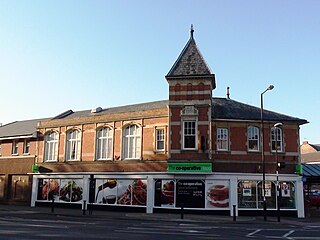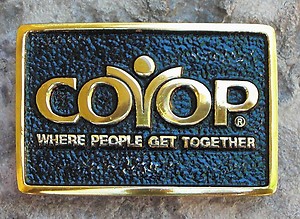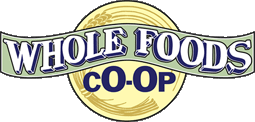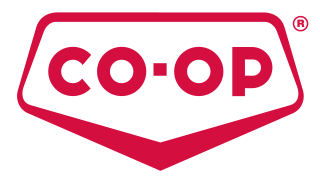
A cooperative is "an autonomous association of persons united voluntarily to meet their common economic, social, and cultural needs and aspirations through a jointly-owned enterprise". Cooperatives are democratically owned by their members, with each member having one vote in electing the board of directors. Cooperatives may include:

A consumers' co-operative is an enterprise owned by consumers and managed democratically which aims at fulfilling the needs and aspirations of their members. They operate within the market system, independently of the state, as a form of mutual aid, oriented toward service rather than pecuniary profit. Consumers' cooperatives often take the form of retail outlets owned and operated by their consumers, such as food co-ops. However, there are many types of consumers' cooperatives, operating in areas such as health care, insurance, housing, utilities and personal finance.
A food cooperative or food co-op is a food distribution outlet organized as a cooperative, rather than a private or public company. Food cooperatives are usually consumer cooperatives, where the decisions regarding the production and distribution of its food are chosen by its members. Like all cooperatives, food cooperatives are often based on the 7 Rochdale Principles, and they typically offer natural foods. Since decisions about how to run a cooperative are not made by outside shareholders, cooperatives often exhibit a higher degree of social responsibility than their corporate analogues.
The history of the cooperative movement concerns the origins and history of cooperatives across the world. Although cooperative arrangements, such as mutual insurance, and principles of cooperation existed long before, the cooperative movement began with the application of cooperative principles to business organization.
People's Food Co-op or just the People's Co-op is a food cooperative located in Portland, Oregon. Founded in 1970 by the members of a food-buying club, the co-op is owned by over 3000 member owners and is a member of the National Cooperative Grocers Association and the United States Federation of Worker Cooperatives.
The Wedge Community Co-op or The Wedge is a food cooperative located in Minneapolis, Minnesota. Located at 2105 Lyndale Avenue South, the Wedge derives its name from the popular nickname for the Lowry Hill East neighborhood, called "The Wedge" due to its shape. The Wedge is a member of the NCBA and the NCGA.

National Co+op Grocers (NCG) is a business services cooperative for retail cooperative grocery stores located throughout the United States. NCG helps unify natural food co-ops in order to optimize operational and marketing resources, strengthen purchasing power, and ultimately offer more value to natural food co-op owners and shoppers everywhere. NCG's headquarters are located in Saint Paul, Minnesota, home to a number of Food Cooperatives, such as Wedge Community Co-op, as well as the historic Minnesota Food Cooperative Wars.
The O., short for "the Organization", also known as the C.O. or Cooperative Organization, was a Maoist or Marxist-Leninist political group that grew out of the Minneapolis-Saint Paul food cooperative movement in the 1970s.

Unicorn Grocery is a co-operative grocery store located in Chorlton-cum-Hardy, Manchester, England. As a workers co-op, it is controlled democratically by its member/owners, who run the business with a flat management structure and with an equal rate of pay. Ethics form the foundations of the business, and Unicorn's Principles of Purpose are the framework within which the business operates.

Consumers' Cooperative of Berkeley, informally known as the Berkeley Co-op, or simply Co-op, was a consumers' cooperative based in Berkeley, California which operated from 1939 to 1988, when it collapsed due to internal governance disputes and bankruptcy. During its height, it was the largest cooperative of its kind in North America, with over 100,000 members, and its collapse has provoked intense discussion over how food cooperatives should be operated.

Whole Foods Co-op is a food cooperative located in Duluth, Minnesota. Founded in 1970 by the members of a food buying club, the grocery is owned by over 10,000 active owners and is a member of the National Cooperative Grocers Association.

New Pioneer Food Co-op, commonly shortened to New Pi, is a locally owned food cooperative based in Iowa City, Iowa. This city also serves as the headquarters of the National Cooperative Grocers Association. In addition to the Iowa City store, New Pioneer has a location in Coralville, and a third location which opened in Cedar Rapids in 2014. New Pioneer Co-op also includes a production hub in North Liberty, Iowa.
Cooperative Development Services (CDS) is a nonprofit organization engaged in cooperative development in the United States. CDS works primarily with food cooperatives and senior housing cooperatives, providing consultation services and co-sponsoring conferences and programs for board members, managers and other professionals in the cooperative sector.

Federated Co-operatives Limited (FCL), operating as Co-op, is a co-operative federation providing procurement and distribution to member co-operatives in Western Canada. It was established in 1944 after a series of amalgamations of smaller cooperatives, starting in Saskatchewan, including the Saskatchewan Co-operative Wholesale Society and a fuel production and distribution co-op, the Consumers’ Co-operative Refinery Limited. Federated had expanded to Manitoba, Alberta, and British Columbia by 1970. Federated Co-operatives is owned by about 160 member co-operatives across the region. Some are large co-operatives, such as Saskatoon Co-op and Calgary Co-op, while others are small co-ops based in small towns, such as Abernethy Co-op.

The Oberlin Student Cooperative Association (OSCA) is a non-profit corporation that feeds and houses Oberlin College students. It is located in the town of Oberlin, Ohio, and is independent from but closely tied to Oberlin College, which has an enrollment of approximately 2900 students. OSCA is the second-largest student housing cooperative in North America, with the largest per-capita of any student co-op.

Citizens Co-op was a food cooperative, or a community owned market located in Gainesville, Florida. It closed in 2016 due to financial issues.
Central Grocers Cooperative, founded in 1917 as Central Wholesale Grocers, was a retailers' cooperative based in Joliet, Illinois, near Chicago. It distributed both brand name and private label goods branded as Centrella and Silver Cup Value Buy to about 400 member-owner grocery stores in Iowa, Indiana, Illinois, and Wisconsin.
The Minnesota Food Cooperative Wars took place in the late 1960s and early 1970s and revolved around the many food cooperatives in the Twin Cities region of Minnesota. The food cooperative movement was started by The People's Pantry, an establishment that aimed to provide bulk-supplied "natural" foods to the surrounding community at wholesale prices. Rival co-operatives such as the Cooperative Organization or CO expanded because of their focus on centralized distribution and Maoist political organizing in contrast to the opposing model of decentralized, organic-food-focused co-ops. In 1975 polarization amongst different types of co-operatives led to vigorous competition, violent altercations, and the territorial seizure of some co-ops. The conflict began to fade out for various reasons during the summer of the following year.









